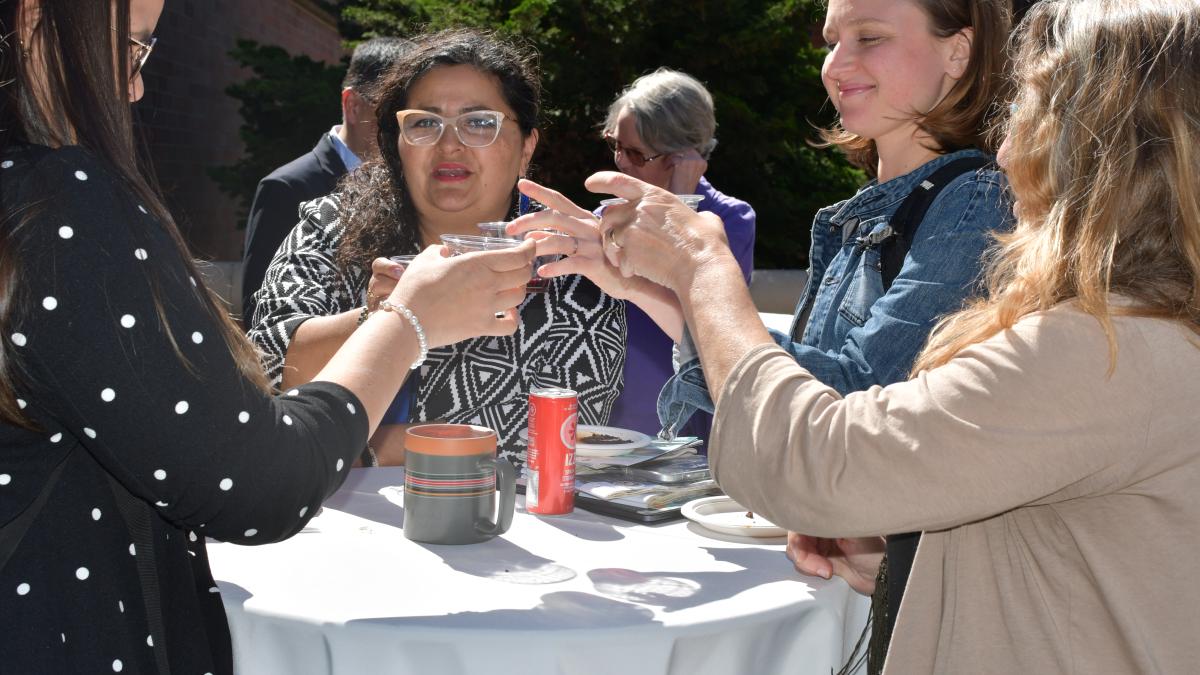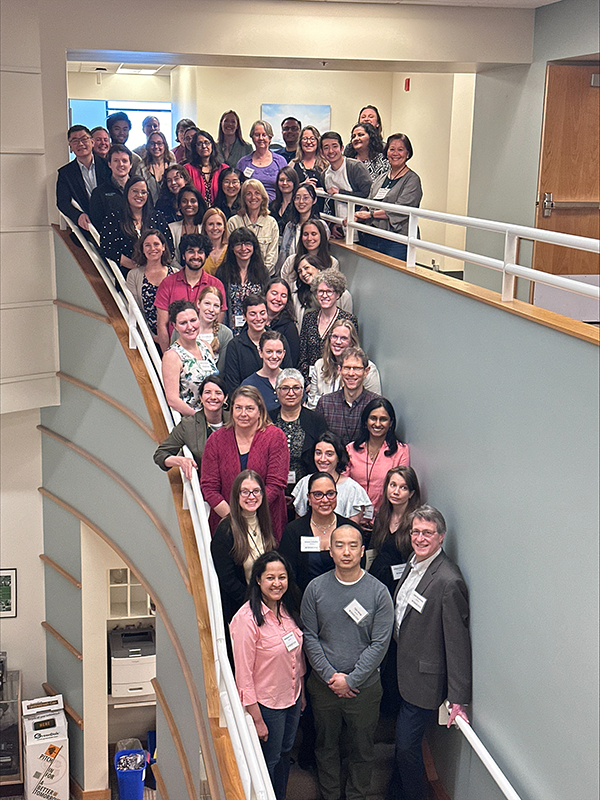
Community partner Paulina Lopez (left of center) toasts the conclusion of a successful event with EDGE members and staff.
In June, the UW Interdisciplinary Center for Exposures, Diseases, Genomics & Environment (EDGE) hosted more than 60 people for its annual symposium showcasing EDGE science and community engagement.
On June 6, the University of Washington Interdisciplinary Center for Exposures, Diseases, Genomics & Environment (EDGE) hosted its annual center symposium in Seattle. The theme for the event was “Enhancing Equitable University/ Community Partnerships.” Over 60 faculty, staff, trainees and community partners attended, representing several UW departments as well as the wider Seattle community.

There was a time when universities and funding agencies provided little support or reward for community-engaged research, Elaine Faustman recalled during the symposium. Faustman is an EDGE member and professor in the UW Department of Environmental & Occupational Health Sciences (DEOHS).
Fortunately, things have changed—health disparities are now widely recognized as a public health crisis, and community engagement is considered to be a best practice in environmental health science, according to EDGE Director and DEOHS Professor Joel Kaufman.
Reflecting the day’s emphasis on community engagement, most of the symposium presentations featured collaborations with community partners, starting with talks by Catherine Karr and Sheela Sathyanarayana. Karr and Sathyanarayana are both professors of pediatrics and professors in DEOHS.
They spoke about their roles working with community members as part of a long-term national study of the effects of environmental exposures on child health and development known as the Environmental Influences on Child Health Outcomes (ECHO) Program.
Next, Mary Crocker and Elizabeth Reznikov of Seattle Children’s Hospital presented their work to improve health outcomes through clinical interventions relating to wildfire smoke exposure and inflammatory bowel disease. Crocker and Reznikov are both UW pediatric and reproductive environmental health scholars supported by Clinical Scientist Institutional Career Development Program awards.
After a short coffee break, Sathyanarayana introduced three of the five 2023 EDGE Pilot Project awardees—all three led by assistant professors in DEOHS.
Yijie Geng presented his work to develop a zebrafish model for studying gene-environment interactions. Erica Fuhrmeister spoke about her work using bioinformatics tools to assess health risks associated with antimicrobial resistance. She has also engaged local high school teachers on the topic of antimicrobial resistance.
Finally, Diana Ceballos and Judit Marsillach spoke about their collaboration to evaluate a new King County project encouraging the use of safer degreasers in auto repair shops. Their project included a community engagement component aimed at educating workers about the health effects of degreasers and safer practices.
Two researchers were unable to present: Tania Busch Isaksen, DEOHS teaching professor, who received a pilot grant to support her work building resilience to extreme heat in Eastern Washington, and Jonika Hash, assistant professor in the UW School of Nursing, who characterized traffic-related air pollution exposure and cellular aging among under-resourced mothers and their children.
Just before lunch, Kaufman passed out awards, including an award for public engagement to Anjum Hajat, an award for most impactful research to Lianne Sheppard, and an award for innovations in research to Alison Paquette.
He also recognized recipients of scholarships to attend an Environmental Justice Boot Camp (Maria Blancas, lecturer and staff member in DEOHS and UW Bothell, and Amber Khan and Mariah Rubin, both graduate students in DEOHS); recipients of four 2025 EDGE pilot awards; and the new EDGE-sponsored career development investigator, Judit Marsillach.
After lunch, Hajat and Paulina Lopez, executive director of the Duwamish River Community Coalition, provided an overview of their work to build an equitable university-community partnership as a foundation for their project known as Duwamish Air Improvement Study for Youth (DAISY). DAISY uses air monitoring and low-cost air cleaners to evaluate an intervention aimed at reducing the health impacts of asthma.
The last session of the day included a panel of community-engaged research experts including Joseph Santana, environmental health equity manager with the Duwamish River Community Coalition; Maria Batayola, a member of the Beacon Hill Council; and Edmund Seto, EDGE deputy director and professor in DEOHS.
Panelists noted that community-engaged research requires effort and patience, but is a necessary piece of research into health disparities. Ideally, it can provide communities with access to resources and expertise that might not be otherwise available, and strengthen the impact of academic investigations.
The day concluded with an outdoor reception where EDGE members, colleagues and friends had a chance to follow up on themes from the day’s talks and do more of the relationship-building emphasized throughout the event.

